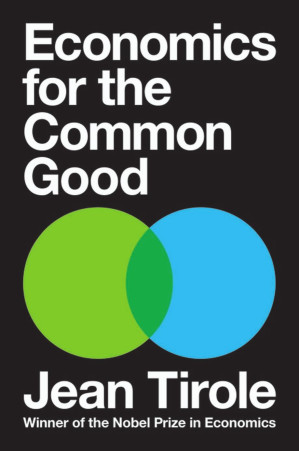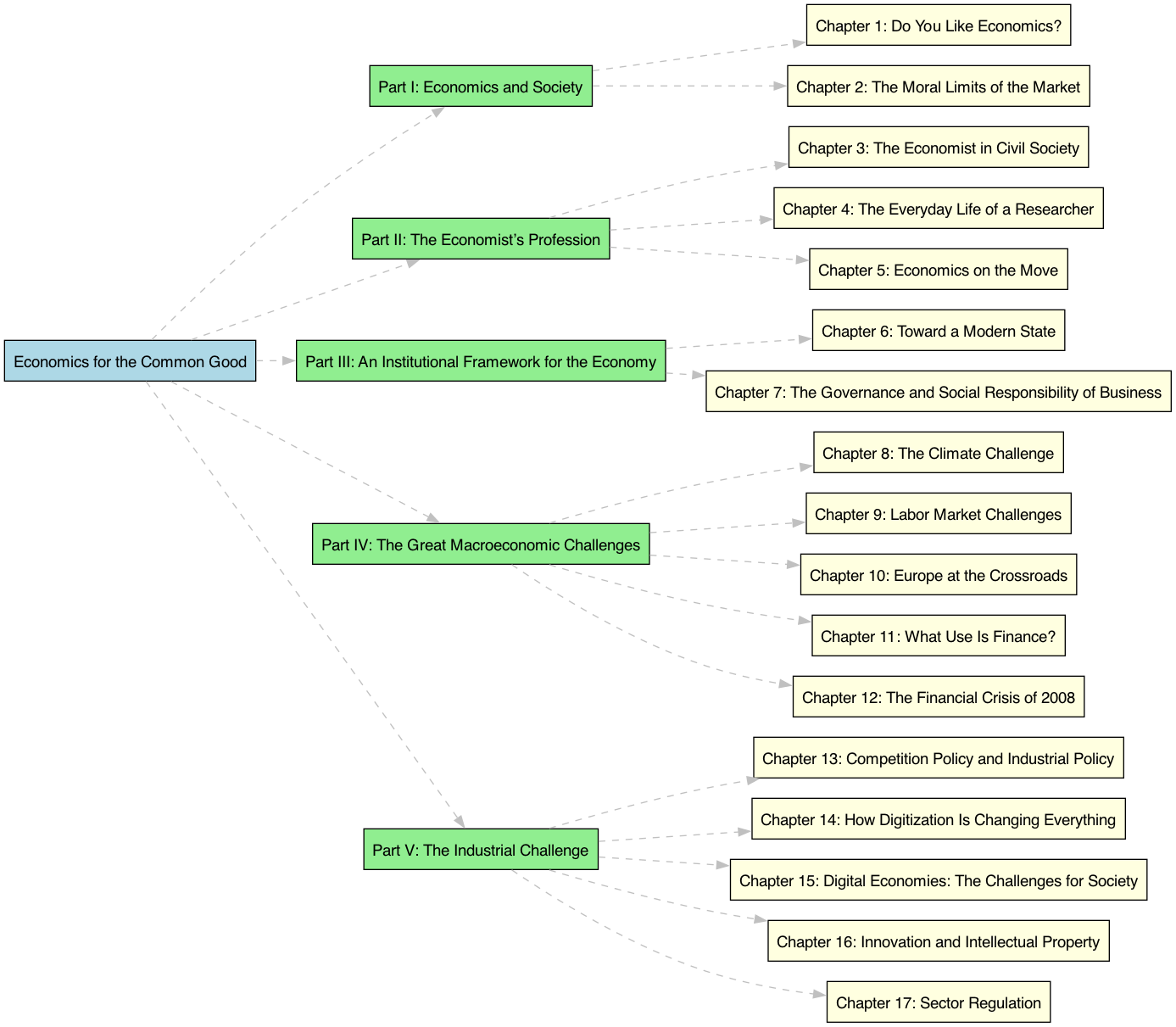Insights from Economics for the Common Good
Reading "Economics for the Common Good" by Jean Tirole has been a transformative experience for me. As someone who is deeply interested in the intersection of economics and society, this book provided a comprehensive and nuanced exploration of how economic principles can be applied to achieve the common good. Tirole, a Nobel Prize-winning economist, delves into various economic theories and their implications for policy-making, societal well-being, and global challenges. I chose this book because of its relevance to contemporary economic issues and its potential to offer valuable insights into how economics can be harnessed for societal benefit.

Summary

Part I: Economics and Society
Chapter 1: Do You Like Economics?
In this chapter, Tirole discusses the general perception of economics and why it often seems inaccessible to the public. He emphasizes the importance of understanding economics to make informed decisions in everyday life. The chapter highlights cognitive biases that hinder our understanding of economic principles and offers ways to overcome these biases.
Chapter 2: The Moral Limits of the Market
Tirole examines the ethical dimensions of the market, questioning whether markets can address moral and social issues. He explores the concept of market failures and the role of government intervention in correcting these failures. This chapter underscores the importance of balancing market mechanisms with ethical considerations to achieve social cohesion.
Part II: The Economist’s Profession
Chapter 3: The Economist in Civil Society
This chapter explores the role of economists as public intellectuals. Tirole discusses the challenges and responsibilities that come with engaging in public discourse and policy-making. He highlights the need for economists to communicate their findings effectively and ethically to influence positive societal change.
Chapter 4: The Everyday Life of a Researcher
Tirole provides an inside look at the daily routines and challenges faced by economic researchers. He explains the interplay between theoretical and empirical research and the role of mathematics in economics. This chapter offers valuable insights into the methodological rigor that underpins economic research.
Chapter 5: Economics on the Move
This chapter delves into the evolving nature of economics as a discipline. Tirole discusses the shift from the traditional homo economicus model to more nuanced understandings of human behavior, including psychological and social factors. The chapter also highlights recent advances in economic theory, such as game theory and information theory.
Part III: An Institutional Framework for the Economy
Chapter 6: Toward a Modern State
Tirole examines the relationship between the market and the state, arguing for a complementary approach to governance. He discusses the need for modernising state institutions to better address market failures and promote the common good.
Chapter 7: The Governance and Social Responsibility of Business
This chapter explores the concept of corporate social responsibility (CSR) and the role of businesses in society. Tirole argues that businesses have a duty to act ethically and contribute to societal well-being beyond profit maximisation.
Part IV: The Great Macroeconomic Challenges
Chapter 8: The Climate Challenge
Tirole addresses the urgent issue of climate change and the economic policies needed to mitigate its impact. He emphasises the importance of international cooperation and the role of economic incentives in reducing greenhouse gas emissions.
Chapter 9: Labor Market Challenges
This chapter explores the dynamics of labor markets, with a particular focus on France. Tirole discusses various labor market reforms and their potential to improve employment outcomes and reduce inequality.
Chapter 10: Europe at the Crossroads
Tirole analyzes the economic challenges facing the European Union, including the Euro crisis and the implications of Brexit. He offers insights into potential reforms to strengthen the EU's economic and political integration.
Chapter 11: What Use Is Finance?
Tirole examines the role of finance in the economy, discussing both its benefits and potential risks. He highlights the importance of regulation in ensuring that financial markets serve the common good.
Chapter 12: The Financial Crisis of 2008
This chapter provides a detailed analysis of the causes and consequences of the 2008 financial crisis. Tirole discusses the failures of both financial institutions and regulatory frameworks, offering lessons for preventing future crises.
Part V: The Industrial Challenge
Chapter 13: Competition Policy and Industrial Policy
Tirole explores the importance of competition policy in promoting innovation and economic efficiency. He also discusses the role of industrial policy in supporting strategic industries and fostering long-term economic growth.
Chapter 14: How Digitization Is Changing Everything
This chapter examines the transformative impact of digital technologies on the economy. Tirole discusses the challenges and opportunities posed by digitization, including issues related to data privacy and market competition.
Chapter 15: Digital Economies: The Challenges for Society
Tirole delves into the societal implications of the digital economy, including the future of work, the gig economy, and the role of digital platforms. He emphasizes the need for policies that ensure equitable benefits from technological advancements.
Chapter 16: Innovation and Intellectual Property
This chapter explores the relationship between innovation and intellectual property rights. Tirole discusses the importance of balancing incentives for innovation with the need for open access to knowledge and technology.
Chapter 17: Sector Regulation
Tirole examines the role of regulation in various sectors, including telecommunications, energy, and transportation. He discusses the challenges of designing effective regulatory frameworks that promote competition and protect consumers.
Key Takeaways
Key Takeaway 1:
- Understanding economic principles is crucial for making informed decisions in both personal and public spheres. Economics provides tools to analyse and address societal challenges.
- This takeaway reinforces the importance of economic literacy for everyone, not just policymakers and academics. It highlights the need for accessible economic education.
- Quote: “Economics concerns all of us in our everyday lives; it is not just for experts.” – Jean Tirole (Chapter 1, page 17).
Key Takeaway 2:
- Market mechanisms alone cannot address all societal issues. Government intervention is necessary to correct market failures and promote social cohesion.
- This point underscores the importance of balanced economic policies that incorporate both market and state interventions. It resonates with the need for ethical considerations in economic decision-making.
- Quote: “The market has many defects that must be corrected.” – Jean Tirole (Chapter 6, page 157).
Key Takeaway 3:
- Economists have a responsibility to engage with society and communicate their findings effectively. Their work can influence public policy and societal outcomes.
- This takeaway highlights the ethical responsibilities of economists. It emphasizes the importance of transparency and effective communication in the dissemination of economic knowledge.
- Quote: “The role of economists is not to make decisions, but to identify the recurring patterns structuring our economies.” – Jean Tirole (Chapter 3, page 66).
Key Takeaway 4:
- Climate change is a pressing economic challenge that requires international cooperation and economic incentives to address effectively.
- This point underscores the interconnectedness of global challenges and the need for collaborative efforts to tackle climate change. It reinforces the role of economics in crafting sustainable solutions.
- Quote: “Climate change may well compromise, in a dramatic and lasting way, the well-being of future generations.” – Jean Tirole (Chapter 8, page 195).
Key Takeaway 5:
- Digitization and technological advancements are reshaping the economy, creating both opportunities and challenges that need to be addressed through thoughtful policies.
- This takeaway emphasises the need to adapt to technological changes while ensuring that the benefits are distributed equitably. It highlights the role of policy in managing the digital transformation.
- Quote: “The digital economy and employment: the new forms of employment in the twenty-first century.” – Jean Tirole (Chapter 15, page 414).
Personal Reflections
"Economics for the Common Good" has significantly broadened my understanding of how economic principles can be applied to address societal challenges. Tirole's insights into the ethical dimensions of economics and the role of government intervention have changed my perspective on the relationship between markets and society. The book has also underscored the importance of economic literacy and the need for effective communication of economic research to the public.
Conclusion
Overall, "Economics for the Common Good" is a compelling and insightful read that offers valuable lessons for anyone interested in the intersection of economics and society. Jean Tirole's thorough analysis and thoughtful reflections provide a roadmap for using economic principles to promote the common good. This book is a must-read for policymakers, academics, and anyone looking to gain a deeper understanding of how economics can contribute to societal well-being.